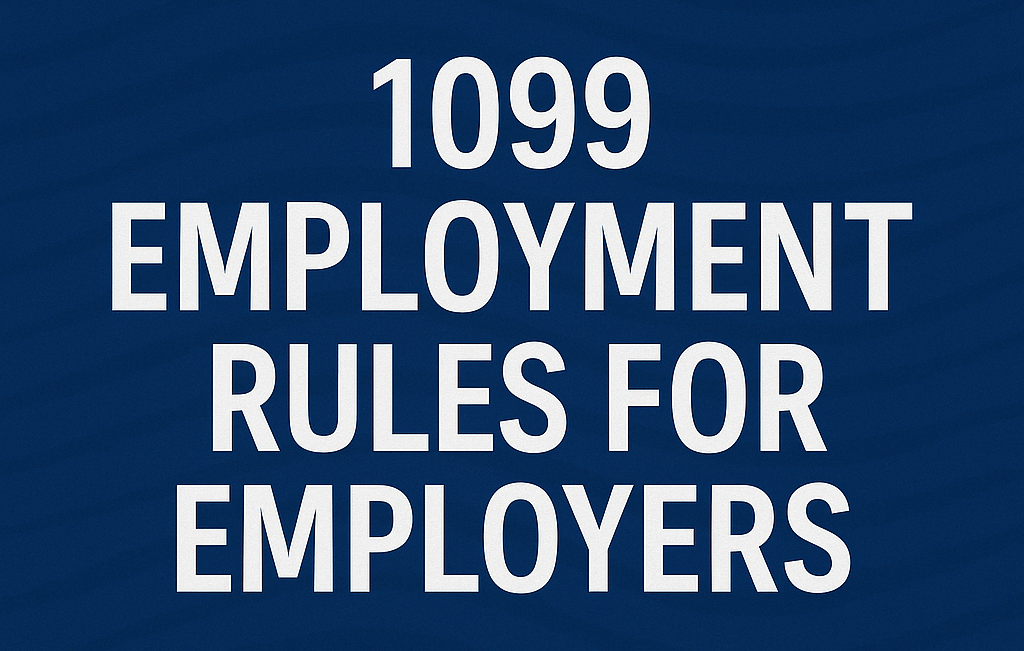1099 Rules Information
Stay Informed about 1099 Employment
Eyra Caldera
7/30/20252 min read


As more businesses embrace flexible hiring practices, 1099 employment has become increasingly common. Hiring independent contractors can save money and provide flexibility, but it also comes with strict IRS compliance rules. Misclassifying workers as 1099 contractors instead of W-2 employees can result in expensive fines and penalties, making it crucial for employers to understand the law.
What Is a 1099 Worker?
A 1099 worker is an independent contractor who provides services without being considered a traditional employee. Unlike W-2 employees, they pay their own federal and state income taxes, cover their own Social Security and Medicare contributions, and handle their own benefits such as health insurance and retirement plans. Employers are not required to withhold taxes or provide benefits. Instead, they must issue Form 1099-NEC by January 31 for contractors paid $600 or more during the year.
IRS Rules for Classifying 1099 Workers
The IRS uses three main tests to determine whether a worker qualifies as an independent contractor. The first is behavioral control. Employees follow employer instructions regarding when, where, and how to work, while contractors control their own schedules, tools, and work methods. The second is financial control. Employees typically receive a salary or hourly wage, while contractors are paid per project, provide their own equipment, and can profit or lose based on efficiency. The third is the type of relationship. Employees often receive benefits, long-term contracts, and company perks, whereas contractors usually work on specific projects with written agreements and no benefits.
Employer Responsibilities When Hiring 1099 Contractors
To remain compliant with 1099 employment rules, employers must take several important steps. First, ensure there is a signed independent contractor agreement in place. Collect a Form W-9 from each contractor before making payments. File Form 1099-NEC for payments of $600 or more during the tax year. Keep accurate records of contracts and payments, and avoid treating contractors like employees by not setting strict hours, offering benefits, or requiring company-provided tools.
Risks of Misclassifying 1099 Workers
Misclassifying workers can trigger severe financial consequences. Employers who incorrectly classify an employee as an independent contractor may face back taxes for unpaid Social Security and Medicare contributions, penalties, interest, and the possibility of IRS audits. In addition, lawsuits for unpaid wages, overtime, and benefits may arise, along with state-level fines for violating labor laws.
As a good employer, it is recommended to request worker's compensation paperwork from your 1099 Subcontractors/Employees. In the state of Florida there is a website where you can check the workers' s compensation insurance to make sure it is active, here is a link you can check the legitimacy of the workers compensation insurance. State of Florida Links to verify worker's compensation coverages https://dwcdataportal.fldfs.com/POCData.aspx
You can also check for the worker's Compensation Exemption if your 1099 Sub is claiming to be exempt from workers compensation https://dwcdataportal.fldfs.com/Exemption.aspx
Hiring 1099 workers can benefit businesses with cost savings and flexibility, but employers must strictly follow IRS contractor rules. To protect your business, ensure each worker is properly classified and always keep thorough documentation. When in doubt, consult a tax advisor or employment attorney.
Here is a direct Link to IRS Site with information about 1099: https://www.irs.gov/forms-pubs/about-form-1099-nec
Contact us at 561-291-9033
© 2025. All rights reserved LGA Services - Palm Beach
